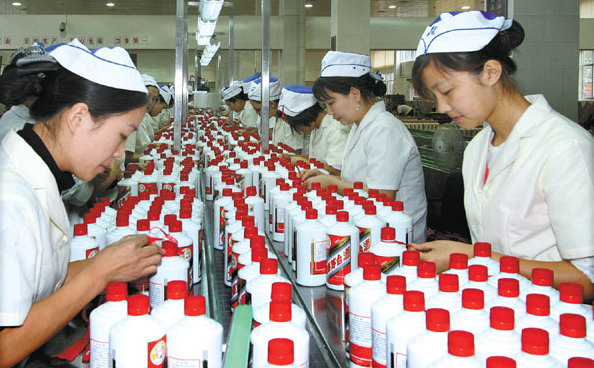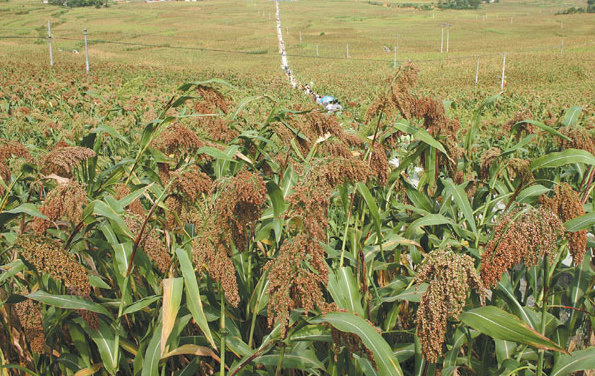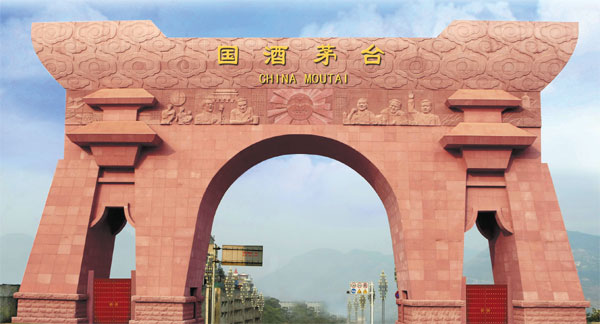Moutai gaining fame beyond borders
Updated: 2014-01-18 01:24
By Zhao Kai and Li Jun (China Daily)
|
||||||||
Leading Chinese liquor brand Moutai was once again among the best-known names worldwide on lists compiled by authoritative brand evaluation agencies in recent months.
It was honored at least once every month from May to August.
The brand's growing position in global rankings signals that Moutai has been validated by the Western brand evaluation system, showing the rise of Chinese brands, critics said.
|
Tucked away in a town in the mountains in Guizhou province, Moutai's manufacturing facility for the brand has a unique environment, which gives the liquor its distinctive characteristics. Provided to China Daily |
|
Workers are packaging Moutai liquor at the company. Zhang Wei / China Daily |
|
The organic sorghum production center Moutai built in 2000 as a raw material source is the first of its kind in the domestic liquor industry. Chen Fei / For China Daily |
Storied past
Long before its fame extended beyond the borders of the nation, the brand had a strong foothold on its home turf.
The time-honored tradition of making the liquor can be traced back to the Western Han Dynasty (206 BC-AD 24), according to the Records of Great Historian, the magnum opus of historian Sima Qian. The story goes that the legendary Hanwu Emperor was impressed by the tasty liquor.
And in the Genealogy of Wu's Family, which was discovered in the Ming Dynasty (1368-1644), there are records of a liquor production workshop in Moutai village in Southwest China's Guizhou province that go back as far as 1,600 years ago, showing locals developed mature liquor-making expertise long ago.
When Moutai won a golden prize at the 1915 Panama Pacific International Exposition, it first rose to fame around the globe. Its brand influence has been so strong over the years that its logo is visible in photos of many important historical events.
One such event occurred during the Xi'an Incident in December 1936, a turning point in modern Chinese history. Two generals, including Zhang Xueliang, led a mutiny in the hopes of pushing their leader Chiang Kai-shek to cooperate with the Communist Party of China and fight against the Japanese invasion.
When Zhou Enlai, a CPC leader, went to Xi'an for negotiations, General Zhang treated him to a bottle of Moutai.
Moutai was also served at a banquet during the Chongqing Negotiation, a critical meeting between Mao Zedong and Chiang, the leaders of the two parties, in the southwestern municipality, after the War of Resistance against Japanese Aggression (1937- 45).
When the Premier Zhou Enlai led a diplomatic delegation to the Geneva conference in 1954, he offered Moutai and the film Butterfly Lover as a gift to guests. From then on, Moutai has been known as national liquor.
Nowadays, Chinese leaders still like using Moutai to entertain guests from around the world.
President Xi Jinping toasted his US counterpart Barack Obama with Moutai during his state visit in early June, 2013.
"We're devoted to promoting traditional Chinese culture and building up Moutai into a business brand of cultural value," said Yuan Renguo, president of Kweichow Moutai Co Ltd.
Unique environment
Tucked away in the sleepy town of Moutai in Guizhou province, the manufacturing facility for the liquor has a unique environment.
The Chishui River that runs through the town originates from neighboring Yunnan province. Because there are no major sources of pollution, such as hydropower stations upriver or over-development, the river remains untainted.
At the same time, the water quality meets the national standards of high-quality drinking water, with appropriate pH and hardness level and mineral content, making the river a perfect water source for making Moutai liquor.
There is an annual phenomenon that causes the river to turn reddish-brown from silt that collects during the rainy season, which lasts roughly from the Dragon Boat Festival in summer to Double Ninth Day in autumn. After this season, the water remains clear for the rest of the year.
Moutai's procedures are in tune with this seasonal rhythm - water is collected on the Double Ninth Day to moisten the sorghum from which the liquor is made.
Also, the company's facilities are located in a valley that is conducive to growing a rich variety of microorganisms.
The microorganisms, which assist in the open fermentation process, are crucial to Moutai's quality, experts said.
Topography is another contributor to Moutai's success.
The soil in the town, rich in minerals, also contains gravel and sand, enabling better water permeability.
This type of soil creates a natural filtration system that purifies the water while adding trace elements of healthy minerals.
Such a rare type of soil plays a vital role in giving Moutai the quality for which it is know, industry observers said.
"The topography is a gift from nature to Moutai," according to the company.
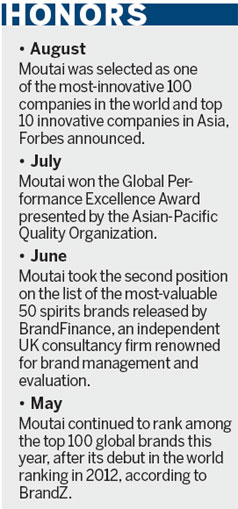
The unique environment endows the liquor brand with qualities that cannot be replicated.
After the government called on the company to increase production of the branded liquor, a new factory was built at a different locale in the 1970s. Despite using same recipe, raw materials and production procedures as well as the same workers and technicians, the new factory failed to reproduce the original Moutai flavor.
The ties between the product and its geographical origin enabled Moutai to become the first liquor to join the ranks of the geographical indication protected in China in 2001.
Ancient, modern mix
Producing a bottle of Moutai takes at least five years from when it is first distilled to when it ships out from warehouses. Its aging times are among the longest in the domestic liquor industry - one year for production, three for storage and one for storage after blending, according to the company.
The traditional procedures involve at least eight cycles of fermentation and nine rounds of high-temperature distillation under strict conditions before the liquor is stored in jars.
"We are proud of our traditional processing methods, a combination of natural resources and fermentation techniques," said President Yuan.
While keeping the traditional techniques alive, Moutain group continues to innovate.
The management formulated a quality standard system that covers the entire production process.
Its R&D team researches microorganisms, food quality and safety, fermentation technology, liquor flavor and how to use modern technologies to improve traditional production processes.
The sources of the product's high quality are an attention to detail coupled with strict control of raw materials and water, according to the company.
About 13 years ago, before it had been popularized nationwide, the concept of organic farming was already instilled in the Moutai staff. They consider farms to be the starting point of production, the company's executives said.
Moutai began to build an organic sorghum production center in 2000 as a raw material source, the first of its kind in the domestic liquor industry. It poured nearly 100 million yuan ($16.4 million) into the sorghum center over the ensuing years.
The Moutai farm has been certified by the Ministry of Environmental Protection as an organic raw materials base and was later recognized by the International Federation of Organic Agriculture Movements as well as many certification agencies in Canada and the European Union.
The high grain content partially explains the mellow flavor of Moutai, industry insiders said.
About 1 kilogram liquor is made out of every 5 kg of grain, which means about 3 kg more grain goes into each bottle than the average domestic producer.
Moutai spends more than 4 million yuan to plant grains in its raw material centers annually, company executives said.
At the company, quality rather than for quantity is rewarded, they said, noting that "quality always comes before the considerations of production output, costs, speed and economic interests. That's our value".
'Bigger stake in society'
"Leading brands should have a bigger stake in society," Moutai President Yuan said.
All Moutai distributors have vowed to "run business in good faith and sell no fakes", an integral part of the company's annual meetings.
The company's sense of responsibility is not only reflected in its distributor management system but also in its prompt, lawful payment of taxes and dividends as well as its transparent corporate governance structure.
In addition to its customers, employees and shareholders, Moutai also shows its corporate social responsibility in charity and rescue efforts.
Right after the severe Wenchuan earthquake in Sichuan province in 2008, the company donated 5 million yuan to the victims and later raised another 31.7 million yuan for reconstruction after the disaster.
It continued to donate 5 million yuan to the quake-affected Yushu area in Yunnan province in 2010 and 20 million yuan to the victims of the Ya'an quake in Sichuan in 2013.
Also, it donated 2.6 million yuan to fight the drought in the southwestern part of the country in 2010 and continued to make nearly 10 million yuan donations afterwards.
Over years, the group company has supported development of local industry and agriculture. In 2008 alone, the financial aid in this direction surpassed 10 million yuan.
Moreover, the company donated 100 million yuan to China Youth Development Foundation in mid-2012 to support 20,000 university and college students from poor rural families across the country.
It is the largest one-time donation to the Project Hope, a charity project co-organized by the foundation and the Communist Youth League Central Committee to help students from poverty-stricken areas afford school education.
The company poured more 100 million yuan into the project in July 2013, supporting 20,000 university students to complete education.
Moutai has donated nearly 1.1 billion yuan in charity from 2006 to 2010.
Since 2009, Moutai issued an annual CSR report in various cities, including Beijing and Guiyang, capital of Guihou province.
A participant in Moutai's denotation ceremony to Project Hope said, "Quality liquor must be made by nice guys. Moutai's corporate culture and values carry a lot of weight with the brand."
Contact the writers at zhaokai@chinadaily.com.cn and lijun@chinadaily.com.cn
Jia Tingting contributed to this story.
|
The company's front gate declares Moutai's status as the nation's most famous spirits. Provided to China Daily |

 Obama bans spying on leaders of US allies
Obama bans spying on leaders of US allies
 Bunnies on parade to celebrate 60 yrs of Playboy
Bunnies on parade to celebrate 60 yrs of Playboy
 Chipmunk fit to burst as it stuffs peanuts into mouth
Chipmunk fit to burst as it stuffs peanuts into mouth
 Wildfire out of control in Los Angeles, US
Wildfire out of control in Los Angeles, US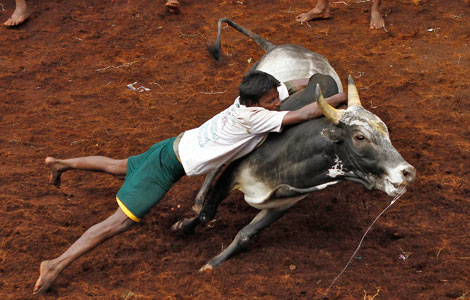
 Bull-taming festival kicks off in India
Bull-taming festival kicks off in India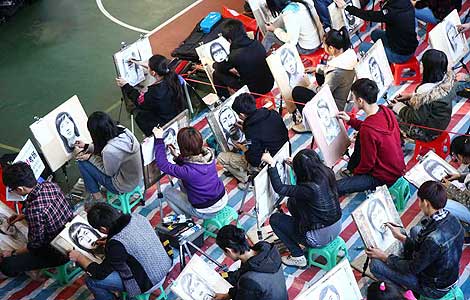
 Way to art school
Way to art school
 'American Hustle,' 'Gravity' lead Oscar nominations
'American Hustle,' 'Gravity' lead Oscar nominations
 138th Westminster Kennel Club Dog Show to open
138th Westminster Kennel Club Dog Show to open
Most Viewed
Editor's Picks

|

|

|
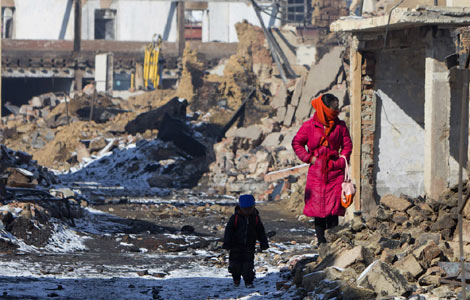
|

|

|
Today's Top News
Tencent's Ma tops China rich list
Obama bans spying on leaders of US allies
US seeks nonexistent threat
Li delivers economic reform vow
Pressure rises on treating pollution
Beijing wants to attract more foreign experts
Dumpling appetites grow after Xi drops in
Looming baby boom no sweat: officials
US Weekly

|

|

